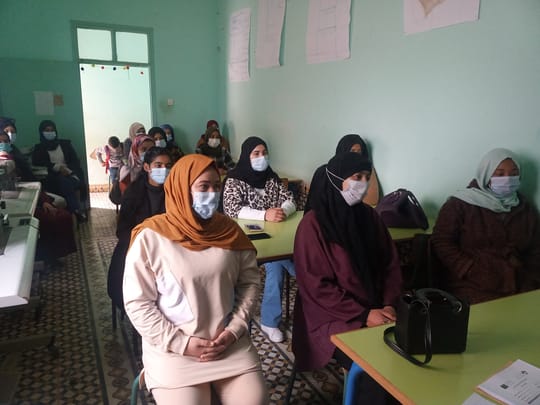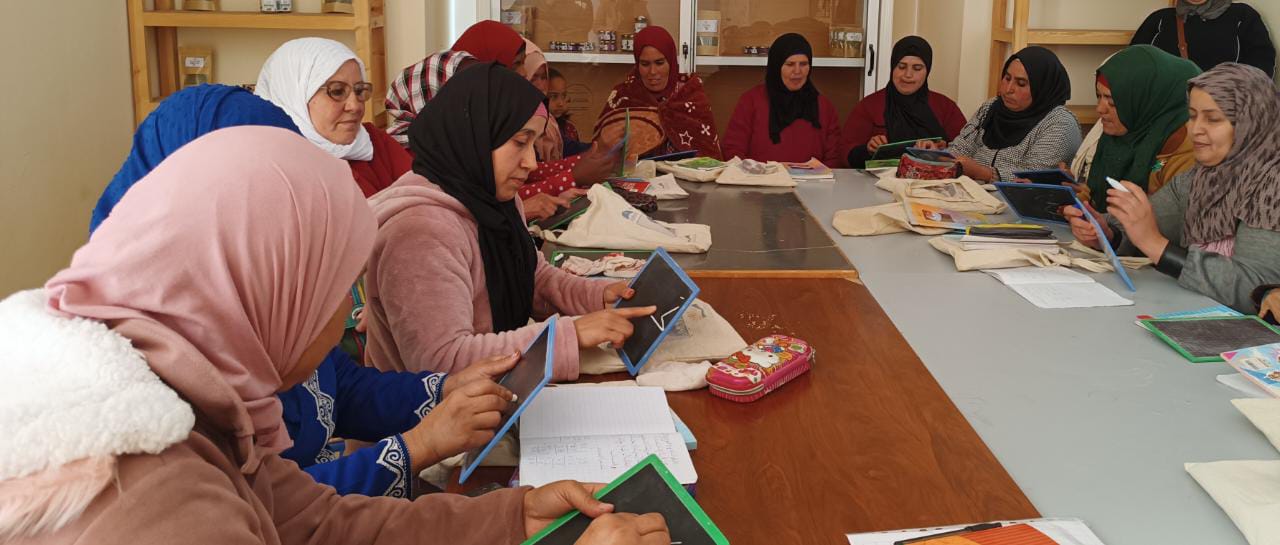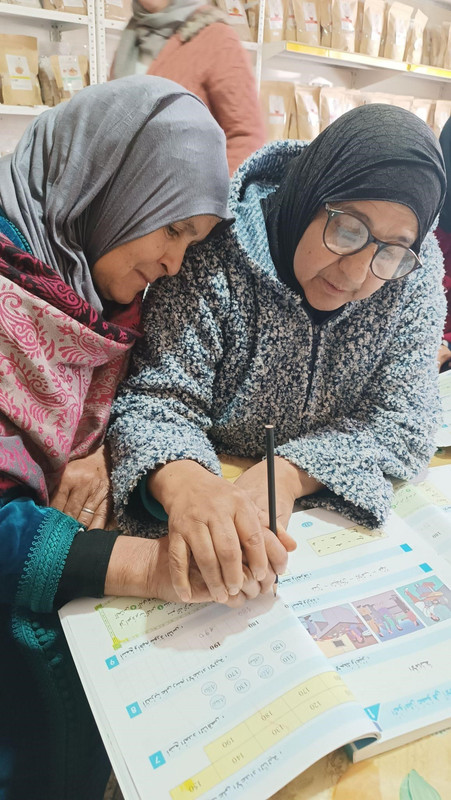Evaluation of Literacy Classes in Beni Mellal-Khenifra

Bouchra Zine
HAF Program Coordinator

Women of Nisae Aska Cooperative in Ait M’Hamed municipality, Azilal province (photo: Bouchra Zine/HAF).
The HAF staff recently traveled to the Beni Mellal-Khenifra region to assess the progress of HAF’s literacy programs, funded by the European Union. Three hundred seventy-eight (378) rural women have participated in the literacy programs, which began in July 2022. They received reading, writing, and math education. To ensure the effectiveness of the program and its implementation, the team is currently conducting monitoring and evaluation fieldwork, visiting cooperatives and groups aged between 30 and 70 who are attending the classes.
Sanae Benaadim, HAF’s Program Manager, and Bouchra Zine, HAF’s Field Coordinator for Beni Mellal Khenifra’s Family Literacy program, began the field trips on February 7, 2023 by attending classes alongside participants to assess their progress. The instructors have taught a total of 192 hours since July 2022, with each group studying 24 hours per month. They devote six hours to each subject included in the program: math, reading comprehension, writing skills and memorizing the Holy Quran.
In the past, the majority of women were merely curious to learn about religion and the Quran. They formerly believed that learning to count and read would be difficult for them because of their age. For them as well, writing was an unreachable ambition. However, women were able to read words and brief sentences. Because of the instructors’ expertise and prior experiences, they can now solve mathematical calculations because they are familiar with numerical units.
The team employed data collection techniques to gain a deeper knowledge of which aspects of the program are having an impact and what needs improvement. To evaluate the status of participants’ learning, they score the participants’ proficiency in math, reading, writing, and memorizing the Holy Quran. Additionally, they evaluate the instructors’ efforts and whether they apply what they learn to the instructors’ instruction.

Members of the Yamna Cooperative in Zaouiat Cheikh municipality in the Beni Mellal province helping each other to write (photo: Bouchra Zine/HAF).
The field tours began in the province of Beni Mellal with 34 women from three cooperatives (Yamna Cooperative, El Yad El Wahida Cooperative, and Lahlinou Cooperative). The team then traveled to the province of Fquih Ben Saleh to conduct the evaluation and monitoring with the 20 members of the Akhawat Kharouba Cooperative. Finally, it was time to travel to the province of Azilal to attend classes with the 46 women of four cooperatives (Tislit Nourtan Cooperative, Abrid Nlkhir Cooperative, Nisae Aska Cooperative, and Wardat Al Atlas Cooperative).
Some attendees are participants in the cooperatives they represent. The women and their professors’ dedication to their work earned praise from more than just the group. The cooperative presidents are ecstatic with the advancement of women. They saw this in the cooperative’s production activities done by women.
“Aicha is a student in one of the literacy classes and a member of our cooperative. She is able to speak in public and express her own opinions,” said Naima, the cooperative’s President at Tislit Nourtan. The Family Literacy Program, according to the President of Wardat Al Atlas cooperative, Hafida, has been one of the best things to happen to her and the other women in the cooperative. “Women in our cooperative are hard workers but they used to be shy to meet customers and that made us problems in selling our products,” she said. “After they began the literacy training, I understood that ladies could meet customers, discuss our items with assurance, and persuade them to buy more by utilizing effective communication language.”
Some cooperative presidents have plans for the participants in their literacy classes who are not cooperative members: “I used to just collaborate with a single team of 10 women. I separated the 40 women who are currently enrolled in classes into 4 groups. Every group works for two days a week. Enhancing women’s ability to work and become independent will help them learn more,” said Saliha, the president of Demnatena cooperative.
Through these field tours, HAF staff observed that every group of women was different in some ways. In certain instructors’ classes, the previous expertise, hard work, and high teaching motivation of the instructor were very obvious. Other instructors, however, used the team’s suggestions to enhance their classes and encourage more women to dedicate themselves in class.
The team will visit the other cooperatives and groups of women in March.